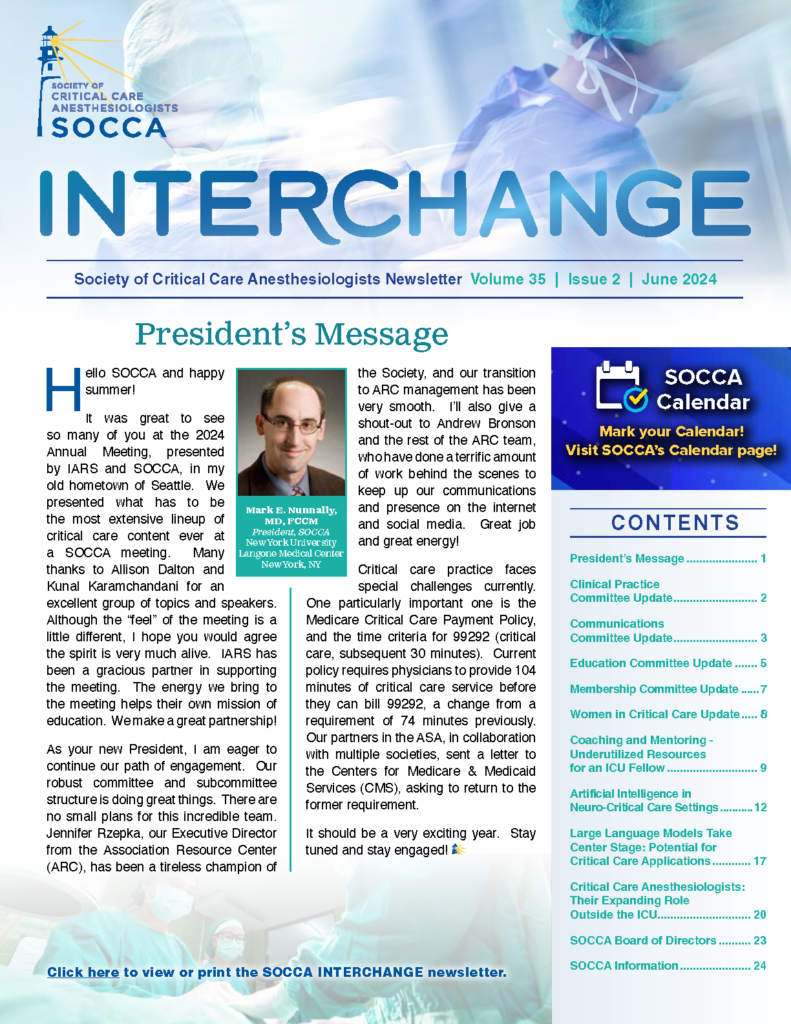SOCCA Early Career Intensivists – Dr. Maccioli’s 12 Rules of Negotiation
The SOCCA Early Career Intensivists group welcomed Dr. Gerald Maccioli this past November to learn about contract negotiations. Dr. Maccioli is an accomplished anesthesiologist with multiple leadership roles throughout his career, including being the former President of SOCCA and Chair of the ASA section on education and research. He is currently the Vice President of Medical Affairs for the Accreditation Commission for Health Care, CMO and Board Advisor of Quick’rCare, CMO of Care Angel, and CMO of Moterum.
Dr. Maccioli’s “12 Rules of Negotiation”
#0) You are the CEO of You: You are your brand. Only you decide your value; no one else. Be able to articulate the value you bring to the table.
#1) Understand your Objectives:
- Clearly define your goals and priorities before entering negotiations.
- Know what aspects of the contract are non-negotiable and where you have flexibility.
#2) Research and Preparation:
- Gather information about the other party’s needs, priorities, and potential constraints.
- Understand industry standards and benchmarks for the terms you’re negotiating.
#3) Build Relationships:
- Establish and maintain a positive and respectful relationship with the other party.
- Cultivate open communication to foster trust and cooperation.
#4) Clearly Define Terms:
- Ensure that all terms in the contract are clearly defined to avoid misunderstandings
- Clearly articulate the responsibilities and expectations of each party.
#5) Prioritize Key Issue:
- Identify and prioritize the most important issues to focus on during negotiations.
- Be willing to compromise on less critical points to achieve agreement on key issues.
#6) Be Flexible:
- Recognize that negotiations often involve give-and-take.
- Be open to alternative solutions and explore creative compromises.
#7) Maintain a Positive Tone:
- Avoid confrontational language or tactics that may hinder progress.
- Frame discussions in a positive manner, focusing on mutual benefits.
#8) Set Realistic Timelines:
- Establish realistic deadlines to keep negotiations moving forward.
- Avoid rushing the process, but also prevent unnecessary delays.
#9) Legal Review:
- Consult with legal experts (specifically an attorney specializing in Employment Agreements) to ensure the contract complies with relevant laws and regulations.
- Address any potential legal issues early in the negotiation process.
#10) Document Everything:
- Keep detailed records of all communications and agreements.
- Ensure that all changes to the contract are documented and agreed upon by both parties.
#11) Consider the Long-Term Relationship:
- Consider the contract’s long-term implications on the relationship between the parties.
- Strive to create a contract that is fair and sustainable for both parties.
#12) Know When to Walk Away:
- Be prepared to walk away if the terms are unacceptable or the other party is unwilling to negotiate in good faith.
- Understanding your BATNA (Best Alternative to a Negotiated Agreement) can strengthen your position.



































